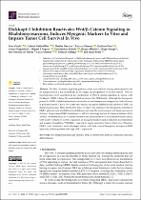Dickkopf-1 Inhibition Reactivates Wnt/β-Catenin Signaling in Rhabdomyosarcoma, Induces Myogenic Markers In Vitro and Impairs Tumor Cell Survival In Vivo

View
Author
Date
2021-11-29Permanent link
https://hdl.handle.net/11351/7614DOI
10.3390/ijms222312921
ISSN
1422-0067
WOS
000735653600001
PMID
34884726
Abstract
The Wnt/β-catenin signaling pathway plays a pivotal role during embryogenesis and its deregulation is a key mechanism in the origin and progression of several tumors. Wnt antagonists have been described as key modulators of Wnt/β-catenin signaling in cancer, with Dickkopf-1 (DKK-1) being the most studied member of the DKK family. Although the therapeutic potential of DKK-1 inhibition has been evaluated in several diseases and malignancies, little is known in pediatric tumors. Only a few works have studied the genetic inhibition and function of DKK-1 in rhabdomyosarcoma. Here, for the first time, we report the analysis of the therapeutic potential of DKK-1 pharmaceutical inhibition in rhabdomyosarcoma, the most common soft tissue sarcoma in children. We performed DKK-1 inhibition via shRNA technology and via the chemical inhibitor WAY-2626211. Its inhibition led to β-catenin activation and the modulation of focal adhesion kinase (FAK), with positive effects on in vitro expression of myogenic markers and a reduction in proliferation and invasion. In addition, WAY-262611 was able to impair survival of tumor cells in vivo. Therefore, DKK-1 could constitute a molecular target,
Keywords
Dickkopf proteins; DifferentiationBibliographic citation
Giralt I, Gallo-Oller G, Navarro N, Zarzosa P, Pons G, Magdaleno A, et al. Dickkopf-1 Inhibition Reactivates Wnt/β-Catenin Signaling in Rhabdomyosarcoma, Induces Myogenic Markers In Vitro and Impairs Tumor Cell Survival In Vivo. Int J Mol Sci. 2021 Nov 29;22(23):12921.
Audience
Professionals
This item appears in following collections
- HVH - Articles científics [4476]
- VHIR - Articles científics [1751]
The following license files are associated with this item:

 Private area
Private area Contact Us
Contact Us







